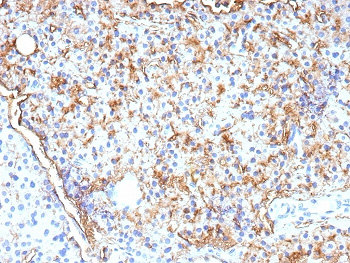- Tel: 858.663.9055
 Email: info@nsjbio.com
Email: info@nsjbio.com
- Tel: 858.663.9055
- Email: info@nsjbio.com
CD109 Antibody reagents target CD109, a glycosylphosphatidylinositol (GPI)-anchored glycoprotein belonging to the α2-macroglobulin/C3, C4, C5 family of thioester-containing proteins. CD109 is expressed on activated T cells, endothelial cells, and subsets of platelets and megakaryocytes. It functions as a co-receptor in signaling pathways and is best known for its role as a negative regulator of transforming growth factor-beta (TGF-β) signaling.
CD109 overexpression has been documented in squamous cell carcinomas, glioblastomas, and other epithelial tumors, where it modulates tumor growth, angiogenesis, and immune evasion. Because of its importance in cancer biology, vascular biology, and immune regulation, the CD109 Antibody is a valuable tool for basic and translational research. The broader category of CD109 Antibodies also supports diagnostic applications, biomarker discovery, and therapeutic development.
NSJ Bioreagents provides CD109 Antibodies validated for immunohistochemistry, western blotting, flow cytometry, immunofluorescence, and ELISA. Each CD109 Antibody undergoes rigorous quality testing to ensure specificity, reproducibility, and minimal background staining.
By choosing CD109 Antibodies from NSJ Bioreagents, researchers gain reagents optimized for clarity and consistency. Our antibodies provide strong staining in tumor biopsies, reproducible protein detection in lysates, and robust performance across experimental workflows. Comprehensive datasheets, validated controls, and suggested protocols further ensure reproducibility in both discovery and clinical applications.
The CD109 Antibody supports a wide array of applications in oncology, vascular biology, and immunology.
CD109 Antibodies detect overexpression in squamous cell carcinomas and glioblastomas.
The CD109 Antibody supports research into tumor growth, angiogenesis, and immune evasion.
CD109 Antibodies provide diagnostic value in differentiating epithelial tumors.
CD109 Antibodies highlight its role as a negative regulator of TGF-β signaling.
The CD109 Antibody supports studies into fibrosis, cancer, and immune regulation.
CD109 Antibodies validate molecular pathways involved in tissue remodeling.
CD109 Antibodies detect expression on endothelial cells and megakaryocytes.
The CD109 Antibody supports studies of angiogenesis and vascular remodeling.
CD109 Antibodies contribute to biomarker validation in vascular disease research.
CD109 Antibodies highlight expression in stem and progenitor cell populations.
The CD109 Antibody supports regenerative biology and cellular reprogramming studies.
CD109 Antibodies help validate differentiation protocols in tissue engineering.
CD109 Antibodies detect expression on activated T cells and immune cell subsets.
The CD109 Antibody supports research into immune suppression and chronic inflammation.
CD109 Antibodies provide translational tools for immunology and autoimmunity studies.
CD109 Antibodies are integrated into biomarker-driven cancer and fibrosis studies.
The CD109 Antibody supports patient stratification in oncology and immunology.
CD109 Antibodies provide reproducibility across translational workflows.
CD109 is a multifunctional GPI-anchored glycoprotein with major roles in tumor biology, immune regulation, and TGF-β signaling. The CD109 Antibody equips researchers with the tools to study expression, localization, and function, while CD109 Antibodies more broadly support diverse research and diagnostic applications.
In oncology, CD109 Antibodies help track tumor progression and immune evasion. In vascular biology, the CD109 Antibody clarifies angiogenesis and remodeling. In immunology, CD109 Antibodies provide insight into activated immune cells and chronic inflammation.
Clinically, CD109 is emerging as both a biomarker and therapeutic target. Reliable antibodies are therefore critical for translating laboratory findings into diagnostic and therapeutic advances.
CD109 is a GPI-anchored glycoprotein with diverse roles in oncology, vascular biology, immunology, and TGF-β signaling. The CD109 Antibody provides validated reagents for studying this protein in cancer, inflammation, and regenerative biology, while the broader range of CD109 Antibodies supports translational research and clinical applications. By ensuring specificity and reproducibility, these antibodies remain indispensable for advancing biomedical science and improving clinical outcomes.

IHC staining of FFPE human parathyroid tissue with CD109 antibody (clone CD109/9955, clone V5675). HIER: boil tissue sections in pH 9 10mM Tris with 1mM EDTA for 20 min and allow to cool before testing.